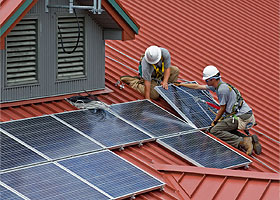It seems the media is bombarding us with a whole range of new terminology I call eco-vocabulary. It’s the latest band wagon that has attracted the attention of environmental groups around the world and is making householders review and question the ways in which their lives interact with the world at large.
Terms like global warming, carbon offsetting, carbon footprints, waste recycling and energy saving are used frequently in day to day conversation now.
Governments around the world are including “green” policies in their portfolios in attempts to attract the eco-vote that is becoming ever larger as the media covers these subject areas with increasing regularity.
An example of this is the UK Government which expects to fight a re-election contest in the near future, and is fighting head to head with opposition parties as they try to take the high ground on environmental issues. The government is funding various groups including the Carbon Trust, which champions initiatives aimed at reducing carbon emissions. Some of their projects are commendable but projects like their carbon labeling scheme are perhaps a step too far at this stage. In this project, companies are being encouraged to use product labeling to indicate how carbon friendly their manufacturing and distribution processes are and how they are reducing carbon emissions over time. Will the shopper really be swayed to purchase food products that are brought to the supermarket shelves in a way that produces slightly less carbon dioxide? There’s no question that many large commercial operations are signing up to these schemes with admirable intentions, but there is also no doubt that many will leverage the current eco-momentum to their own advantage through associated marketing programmes.
Schemes like this labeling project are aimed at targeting the conscience of shoppers and include no penalty or reward as the incentive. Other schemes are more direct and attract penalties for those who do not comply. A prime example of this type of scheme is government taxation on things like flights, which allegedly generate huge amounts of carbon dioxide when compared to other forms of travel. The eco-taxation card can also be played quite easily by governments when it comes to cars. Encouraging people to chose smaller, more efficient vehicles is easy when you hold the ability to target people finances directly.
So how can the typical householder contribute efficiently to cleaner environmental ways of living? Well the easiest step is tackle the simple things first, things that take very little extra effort but make significant contributions. Some of these include using your car less – one or two journeys saved per week by everyone will have a big impact. Careful disposal of all candidate waste from the home is also a simple step – paper, cardboard, glass, tin cans can all be recycled easily. Recycling all suitable garden and vegetable waste in a garden composter is also simple. Purchasing food items with less packaging is very easy to do. More ambitious home projects such as solar panelling and small wind turbines for home energy production are becoming more popular and attract government grants in many countries now.
Other ways of reducing carbon dioxide production include various energy saving ideas like turning off unnecessary lighting in the home, completely switching off appliances that have standby modes or appliances that you may have left on when not in use, for example home computers.
With a view to the longer term, there are two things that should not be forgotten when it comes to tackling environmental concerns. Firstly, education should be a headline initiative. Teaching our children about the global warming impact of the ways in which we lead our daily lives is crucial. Acceptance of any initiative in the future will be much easier if people already understand the issues at stake.
The second important factor is that this really is a global problem. By that I mean that the actions of one nation can positively or negatively affect the lives of others. The admirable actions of one nation can be quickly cancelled out by the neglect of another. Also the people likely to be most affected by global warming are not those causing the problems in the first place.
So look at the way your run own home. Are you doing the basic things to contribute to more effiecnt use of energy and resources. These things take little extra effort or cost. Then if you want to make a more significant contribution, take further, more ambitious steps, to run an eco-friendly household. You’ll feel better for it and, eventually, so will others in the future!
